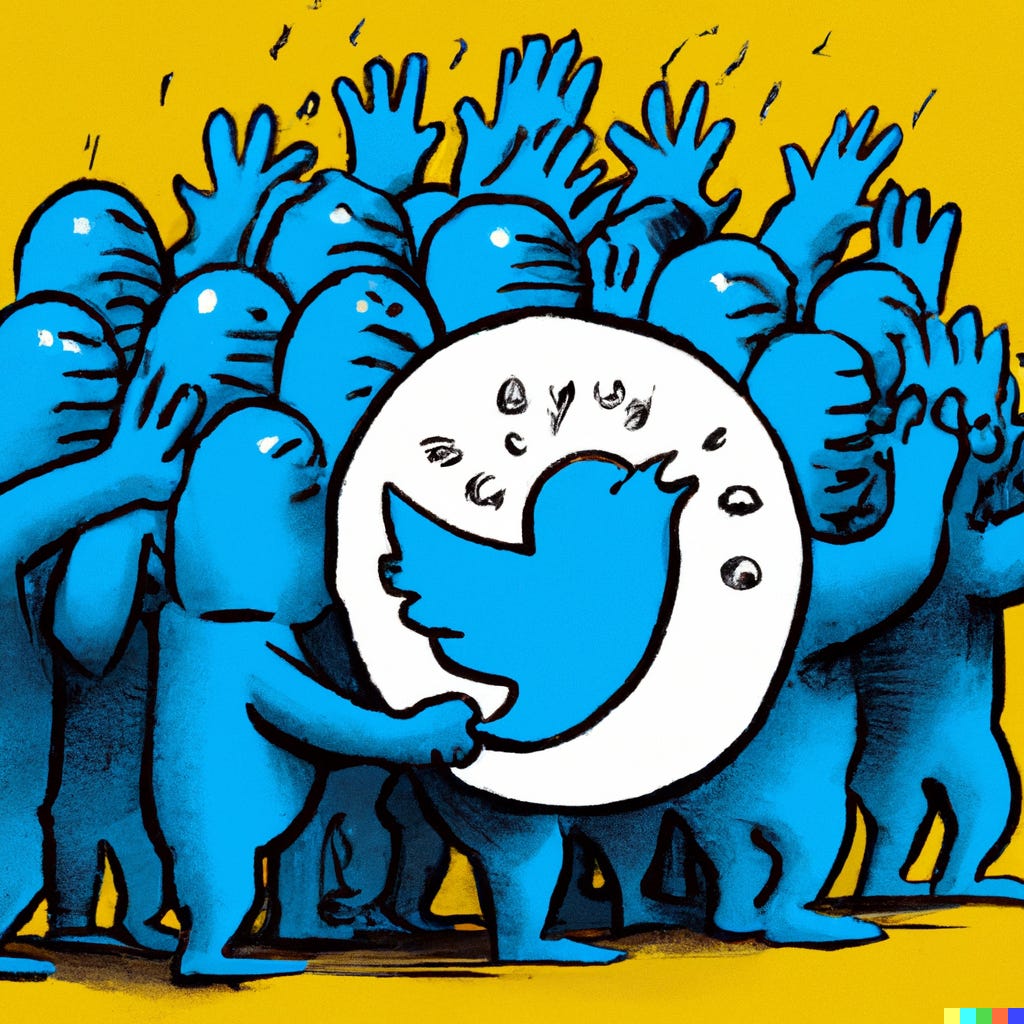The (same) winner from Elon's Twitter buy
Tippets #180: Matt Levine on crypto, Moneyball, detail, and more. Enjoy!
A warm welcome to new readers getting this for the first time. Thank you for letting me be a small part of your week. As a reminder, Tippets is where I share what's on my mind and a curated assortment of tidbits and snippets (aka. tippets!) from around the web. If you were forwarded this newsletter and would like to receive it in the future, click below!
Elon Musk is the new official owner of Twitter. And the Internet and the Media have gone nuts. The fact that he arrived at HQ on Friday carrying a sink added a new layer of dramedy to the saga.
And it continued. People pretending to be laid-off Twitter employees are getting attention (and their own Halloween costumes!) Elon’s let go of the C-suite (and apparently trying to do so with cause to (presumably) avoid paying tens of millions in severance. He’s got his folks in a war room alongside employees from SpaceX and Tesla. Verified Users will now have to pay $20 a month to stay verified. And there is talk that Trump might even get reinstated.
Chaos.
And, with all eyes on the Chief Twit, my thoughts turn to the man I called out as the real winner from Elon’s Twitter buy back in May: meta’s Mark Zuckerberg.
The timing of Musk’s buy couldn’t have been better scripted for the man at the head of the world’s largest social network - twice. The company formerly known as Facebook announced earnings this week, and all is not well in the house that Zuck built. The company missed its earnings target, showed slower user growth than usual, and has not done enough to convince the market that the all-out bet on the metaverse makes sense. Ad revenue came in down as well, which, while not unexpected given the current market conditions, still only served to pile on. And the market piled on. Shares dropped by over 20% overnight. With shares down almost 70% from last year’s peak, a Twitter distraction is still a good thing. Only now, with Twitter no longer public, it might not offer the same level of cloud cover.
Tippets from Around the Web:
The Only Crypto Story You Need
This piece on crypto by the inimitable Matt Levine is a whopping 40,000 words. I will admit to not having read them all (yet). But based on the ones I have already, this does not disappoint. Whether you’re new to crypto, have dabbled a bit, or are way down the rabbit hole, my guess is you’ll learn something.
What Moneyball-for-Everything Has Done to American Culture
In everything from music to movies to sports, we are using data and analytics to develop a deeper understanding of what works, what doesn’t, and, as much as possible, how to predict success. This piece by Derek Thompson in The Atlantic questions asks, “Is this a good thing?”
The religion scholar James P. Carse wrote that there are two kinds of games in life: finite and infinite. A finite game is played to win; there are clear victors and losers. An infinite game is played to keep playing; the goal is to maximize winning across all participants. Debate is a finite game. Marriage is an infinite game. The midterm elections are finite games. American democracy is an infinite game. A great deal of unnecessary suffering in the world comes from not knowing the difference. A bad fight can destroy a marriage. A challenged election can destabilize a democracy. In baseball, winning the World Series is a finite game, while growing the popularity of Major League Baseball is an infinite game. What happened, I think, is that baseball’s finite game was solved so completely in such a way that the infinite game was lost.
Play for the Front of the Jersey
Working for startups is often analogized to playing on a sports team. In many ways, it is. A team working together towards a common goal, each person bringing their own set of skills and experience to bear to help the group win. But, as Ravi Gupta, Sequoia Partner and former CFO at Instacart, outlines in this blog post, there is one key difference: Professional athletes often have to decide between doing what’s best for the team’s success or their individual success. Many people assume this same kind of dynamic exists within startups. They wonder if they should do what’s best for their company or do what’s best for their career. But this is a false choice.
At a startup, being a me-first player is just a bad strategy. There are no individual statistics. Playing for the front of the jersey is the best way to play for the back of the jersey. The only thing that matters is playing for a winning team.
Reality has a surprising amount of detail
What starts out as an explanation of how to build stairs turns into a terrific essay on the importance of both looking for and understanding the details of how something works. This one is worth a read and some time afterward to meditate upon the message and implication for your day-to-day work.
But the existence of a surprising number of meaningful details is not specific to stairs. Surprising detail is a near universal property of getting up close and personal with reality.
This means it’s really easy to get stuck. Stuck in your current way of seeing and thinking about things. Frames are made out of the details that seem important to you. The important details you haven’t noticed are invisible to you, and the details you have noticed seem completely obvious and you see right through them. This all makes makes it difficult to imagine how you could be missing something important.
Quote I'm thinking about: “When you can’t change the direction of the wind — adjust your sails.” ~ H. Jackson Brown
If you enjoyed this issue, doctors recommend you click the button below and get Tippets by Taps in your inbox every week. It’s good for your health!
Please share what you’re reading! If you have insight on anything mentioned above or have any interesting links/papers/books that you think would be worth sharing in future issues of Tippets, please reach out! Click here, reply to this email, or DM me on Twitter at @taps.
How did you like this week’s Tippets? Your feedback helps me make every issue better.





